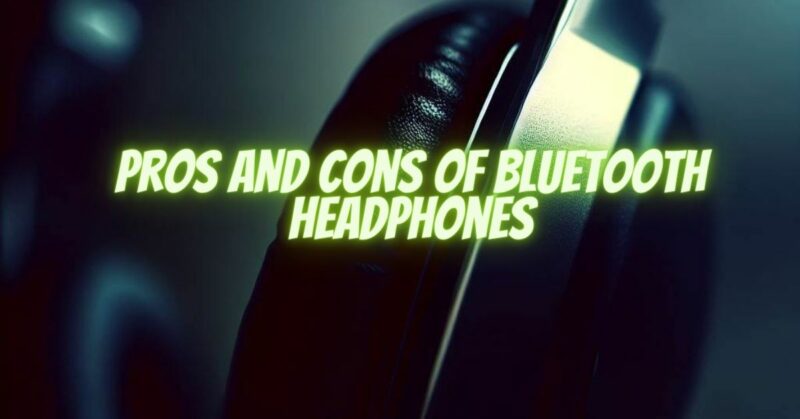Bluetooth headphones have become a staple in the world of audio, providing wireless convenience and freedom of movement. But are they the right choice for you? In this article, we’ll delve into the pros and cons of Bluetooth headphones, helping you make an informed decision.
Pros:
- Wireless Freedom: Say goodbye to tangled cords and restrictive cables. Bluetooth headphones offer the freedom to move around without being tethered to your device. Whether you’re working out, commuting, or simply enjoying your favorite tunes, the absence of cables allows for a more enjoyable and hassle-free experience.
- Easy Connectivity: Bluetooth technology enables seamless connectivity with a wide range of devices. Pairing your headphones with your smartphone, tablet, or laptop is a breeze, often requiring just a few taps on your device’s settings. This simplicity ensures that you can quickly connect and enjoy your audio without any technical hurdles.
- Portability and Convenience: Bluetooth headphones are designed with portability in mind. They are lightweight, compact, and easily foldable, making them ideal for travel and on-the-go use. Slip them into your bag or pocket, and you’re ready to enjoy your music or take calls wherever you are.
- Versatility: Bluetooth headphones are not limited to music playback. They often come equipped with built-in microphones, allowing you to make hands-free calls and participate in voice chats. This versatility makes them a valuable tool for work, gaming, and communication.
Cons:
- Battery Life: Bluetooth headphones rely on internal batteries to function wirelessly. While battery technology has improved significantly, it’s essential to consider the battery life of your headphones. Depending on the model and usage, you may need to recharge your headphones regularly. It’s worth noting that battery life can vary, so be sure to choose a pair with a battery that meets your needs.
- Audio Quality: Although Bluetooth technology has advanced, some audiophiles argue that wired headphones still offer superior sound quality. Bluetooth headphones use compression algorithms to transmit audio wirelessly, which can result in a slight loss of audio fidelity. However, it’s important to note that the difference in sound quality may not be noticeable to the average listener.
- Compatibility: While Bluetooth is a widely adopted technology, it’s essential to ensure compatibility with your devices. Some older devices may not support Bluetooth or have limited Bluetooth capabilities. Additionally, different Bluetooth versions (e.g., Bluetooth 4.0, 5.0) may offer varying features and performance. Check the compatibility of your devices to ensure a seamless connection.
- Interference and Range: Bluetooth operates on radio waves, which can be susceptible to interference from other electronic devices or physical obstacles. The range of Bluetooth connectivity can also vary, typically ranging from 30 to 100 feet. If you venture too far from your connected device or encounter interference, you may experience drops in connection or audio quality.
In conclusion, Bluetooth headphones offer a host of benefits, including wireless freedom, easy connectivity, portability, and versatility. However, they do come with considerations such as battery life, audio quality, compatibility, and potential interference. It’s important to weigh these factors against your personal preferences and usage patterns to determine if Bluetooth headphones are the right fit for you.
So, whether you’re a music aficionado, a fitness enthusiast, or someone who values the convenience of wireless technology, Bluetooth headphones can be a game-changer in your audio experience. Embrace the wireless revolution, and enjoy the freedom of untangled audio bliss.


